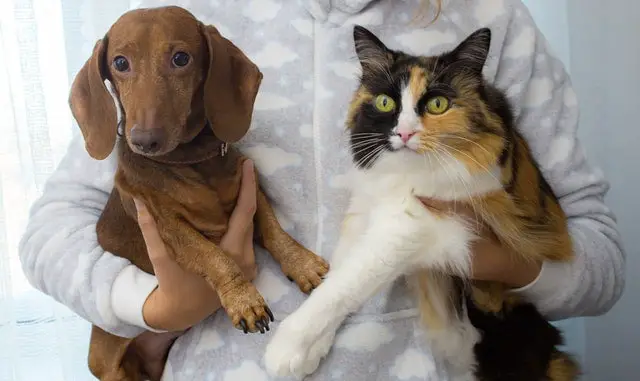
Does the cat have a memory? Let’s find out how our beloved felines store memories and how they use them to live everyday life.
Many owners of these beloved felines will have wondered if they have memory and what capacity they have to memorize what happens around them, maybe someone will have even hypothesized a comparison between the memory of the dog and that of the cat. Here, then, is how some Japanese studies have clarified the mnemonic potential of the cat, what type of memory it uses and also how its brain works. Here’s everything you need to know about cat memory.
Memory of the cat VS memory of the dog
If it has always been thought that the memory of dogs was superior to that of cats, we must change our minds: dogs do not have a mnemonic capacity compared to cats. Indeed, apparently the felines far outnumber them. How did we find out?
Some examples of cats and dogs have been subjected to memory tests and have scored several points in their favor, equaling and surpassing those of Fido. In fact, the substantial difference between the two specimens was in the ability to remember the most pleasant events, which dogs often do not remain etched in the memory. Let’s think of an episode that remained memorable for us, while for the dog it may not have ‘made a difference’.
Studies have shown that a cat was able to remember a particularly tasty snack, which they liked very much. This is the so-called ‘episodic memory’, that is the one that allows you to recover the memory of a specific event starting from a detail.
Memory of the cat: the study
The Japanese research mentioned above has subjected as many as 49 specimens of domestic cats to some rather simple memory tests. One of these was the ability to remember which bowl they had eaten the baby food from after 15 minutes had elapsed from the meal. The study showed that not only were they able to remember the bowl but also the type of food ingested, they even remembered where the container was placed. Although the chosen time frame was only 15 minutes, Japanese scholars confirmed that the cats would be winning even if more time had passed since the event to remember.
Memory of the cat and human memory
Let’s think of an event that marked our existence, such as the first day of school, but let’s also try to remember what we ate yesterday lunch: most likely we will be able to remember the event. In fact, our human memory works in episodes: we remember the single event, ‘reconstructing’ it in the past. These are often personal episodes, which remain etched in the memory of the individual.
What does our memory have in common with the feline one? Both dogs and cats have episodic memories, because they remember a single past experience. In recent years, several studies on cat memory have been conducted. The study showed that cats are able to remember an episode that happened 15 minutes ago and to gain experience from it.
Cat memory: how it works
Thanks to the aforementioned Japanese study it was found that cats reason by acquiring and remembering some information, which answers some basic questions such as ‘what’ and ‘where’. Answering these questions, cats would have the necessary elements to remember a single lived experience, even a rather simple one, such as their last meal.
Another research, was instead more merciless towards our beloved felines. According to these studies, in fact, the memory of cats would be efficient but for a limited period of time. In fact, the experiments conducted on 24 feline specimens have shown how much they do not have a great ability to remember actions with hidden objects. The cats, divided into 4 groups, were trained to remember which box the hidden object was hiding behind. In this test the cats have shown that their memory tends to wane for disappearing objects and tends to diminish rapidly.
Cat memory: how the brain works

Since we may not be able to explain to ourselves how a cat can remember an unpleasant face of a guest they have seen only once, but cannot memorize the things to ‘not do’, it is good to mention his brain. Of course, always without pretending to give scientific answers in this regard.
The feline brain works differently depending on whether you have to remember events, people’s faces or objects. Even in the brain composition, the cat’s brain does not differ much from the human one. Structurally, the cat’s brain also has frontal, temporal, occipital and parietal lobes, as well as having gray and white matter, just like us humans.
But where are the cat’s memories ‘contained’? Each in a neuron. When the external stimulus arrives then the neuron, in combination with others, perceives it and is stimulated to remember.
It is not possible to talk about memory without also dealing with learning. In fact, we humans also tend to remember procedures and passages acquired through memory to ‘exploit’ them at the right moment. Memory is at the same time linked to the experience one has of a certain thing or event: let’s think about when a cat gets burned in front of a fire. The memory, or rather the pain of remembering, will tend not to bring the cat ever closer to the lit fireplace.
Finally, the feline’s memory works according to a mechanism of imitation: in fact, by observing everything that surrounds it and how others do it, the cat learns to do things and imitates them. Especially when it comes to a memory that can be ‘useful’ to him, he will tend not to forget it.
Cat memory: a matter of pleasure
With this basic concept we will be able to explain why a feline can remember where its food bowl is, but does not ‘memorize’ our call for scratching the upholstery. Here everything will appear clearer if we think that feline logic responds to only two concepts: what pleases him and its opposite. If something is useful to him and he likes it then we can be sure that he will remember it, while our calls will end up being lost in the wind.
This is the reason why it is advisable not to scold the cat, when to make it unpleasant the action we do not want it to do: for example, if we do not want it to come close to a certain area of the house, we try to sprinkle it with an unpleasant smell. So finally it is clear that the feline has a long-term memory from which it draws useful elements that will serve it throughout its entire existence. On the other hand, it is thanks to this type of memory that cats have managed to memorize the weak points and hiding places of the enemies in order to hunt them.






